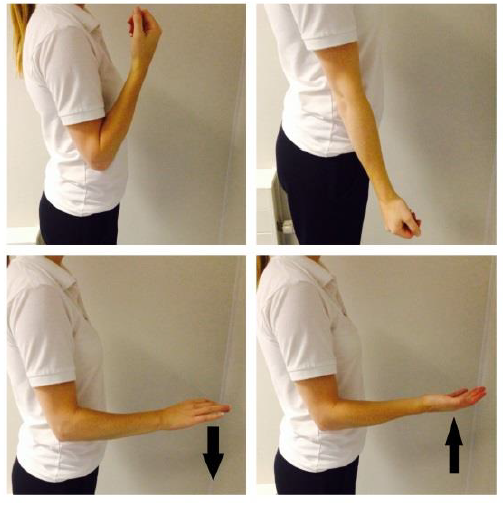Undisplaced Greater Tuberosity Fracture
NHS Virtual Fracture Clinic - Greater Tuberosity Fracture
About your injury:
Your shoulder is a ball and socket joint. You have fractured the outside of the ball part of the joint.
Healing:

This normally takes 6-12 weeks to heal. 
Smoking will slow down your healing. We would advise that you stop smoking while your fracture heals. Talk to your GP or go to www.smokefree.nhs.uk for more information.
Pain and swelling:
Your shoulder may be swollen and you will have some pain. Taking pain medication and using ice or cold packs will help. More information is below.
Wearing your sling:
 Use your sling for 3 weeks. You can
Use your sling for 3 weeks. You can take it off to wash, dress and do your exercises. It does not need to be worn at night.
take it off to wash, dress and do your exercises. It does not need to be worn at night.
Exercise and activity:
It is important to start gentle exercises straight away to prevent stiffness. You will find pictures and instructions for your exercises below.
You should not do any heavy lifting for the first 6 weeks.
Follow up:
You will see a shoulder specialist 3 weeks after your injury. They may do another x-ray to check the position of your fracture. They will explain the next stage of your rehabilitation.
If you have not received your appointment letter within 1 week, please contact us.
Contact us:
If you are concerned about your symptoms, are unable to follow this rehabilitation plan or have pain other than at the site of your injury please contact the Virtual Fracture Clinic team.
Caring for your injury: Weeks 1-4
Remember to use your sling for the first 3 weeks. Take it off to wash, dress and do your exercises. You don't have to wear your sling at night. You may find it more comfortable to sleep propped up on pillows
Using a cold pack will help with your pain and swelling. You can use an ice pack or bag of frozen peas wrapped in a damp towel. Put this on your foot for up to 15 minutes every few hours. Make sure the ice is not in direct contact with your skin.
Try to rest your arm, especially in the first 24-72 hours.
Exercises:
Start these exercises straight away. Try do these exercises 4-5 times a day. Repeat each exercise 10 times.
Hand, wrist and elbow exercises:
|
1. Open and close your hand. Next, move your wrist up and down. Repeat 10 times. 2. After a few days, hold a soft ball or rolled up socks. Squeeze the ball and hold for 5 seconds. Repeat 5 times. |
  |
|
3. Bend and straighten your elbow. Repeat 10 times. 4. Bend your elbow to a right angle. Slowly turn your palm up to the ceiling and down to the ground. Repeat 10 times.
|
|
Posture Exercise:
| 1. Bring your shoulders back and gently squeeze your shoulder blades together. Hold for 20-30 seconds. Repeat 5 times. |   |
Shoulder Pendulum Exercise:
|
1. Stand next to a firm surface. Support yourself with your un-injured arm and lean forwards. Let your injured arm relax and hang down to the ground. 2. Gently swing your arm, making a small movement. Try to do this forward and backward, side to side and in small circles. 3. Aim to do this for 1-2 minutes in total. You do not need to push into pain. Remember to keep your arm relaxed. |
 |
Caring for your injury: Weeks 4-6
You can now return to light activities. Remember, you should not do any heavy lifting for 6 weeks.
Exercises:
Start these exercises 3 weeks after your injury. Try to do them 4-5 times a day. Repeat each exercise 10 times.
|
Active Assisted Flexion 1. Use your other hand to lift your injured arm up in front of you, as shown in these pictures. |
 |
|
Active Assisted External Rotation 2. Keep the elbow of your injured arm tucked into your side and your elbow bent. Hold onto a stick, umbrella or something similar. 3. Use your good arm to push your injured hand outwards. Remember to keep your elbow tucked in. 4. If you don't have a stick, hold your injured arm at the wrist, guide it outwards with your good hand. |
 |
Caring for your injury: Weeks 6-12
You can now return to light activities. Do this gradually and be guided by any pain or discomfort your experience. Some heavier tasks may still be uncomfortable.
Exercises:
Start these exercises 6 weeks after your injury. Try to do these exercises 4-5 times a day. Repeat each exercise 10 times.
Active Flexion:
Lift your arm forwards in front of you. Try to raise the arm as high as you can. You do not need to push into pain. If this is too difficult, try the same movement with a bent elbow.

Active Abduction:
With your palm facing forwards, move your arm out to the side in a big arc. Try to raise the arm as high as you can. You do not need to push into pain If this is too difficult, try the same movement with a bent elbow.

Active External Rotation
Start with your elbow bent by your side. Move your forearm out to the side, keeping your elbow bent and near your waist.

Frequently asked questions


